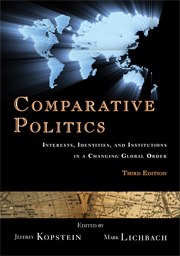Book contents
- Frontmatter
- Contents
- List of Maps
- Preface to the Third Edition
- List of Contributors
- 1 What Is Comparative Politics?
- 2 The Framework of Analysis
- PART ONE EARLY DEVELOPERS
- 3 Britain
- 4 France
- STOP AND COMPARE
- PART TWO MIDDLE DEVELOPERS
- PART THREE LATE DEVELOPERS
- PART FOUR EXPERIMENTAL DEVELOPERS
- Index
- References
4 - France
from PART ONE - EARLY DEVELOPERS
- Frontmatter
- Contents
- List of Maps
- Preface to the Third Edition
- List of Contributors
- 1 What Is Comparative Politics?
- 2 The Framework of Analysis
- PART ONE EARLY DEVELOPERS
- 3 Britain
- 4 France
- STOP AND COMPARE
- PART TWO MIDDLE DEVELOPERS
- PART THREE LATE DEVELOPERS
- PART FOUR EXPERIMENTAL DEVELOPERS
- Index
- References
Summary
Introduction
The United States and France have a long-standing love–hate relationship of mutual respect, envy, and suspicion. The French came to the rescue of the American revolutionaries in their War of Independence from Britain, and twice in the twentieth century, American soldiers, proclaiming, “La Fayette, we are here,” helped France repel German invaders. Despite – or perhaps because of – their ancient alliance, France and the United States have suspected and accused one another of disloyalty and imperial ambitions. Eager to assert its autonomy after having become a nuclear power, France in 1966, for example, withdrew from the North Atlantic Treaty Organization's U.S.-led integrated command structure. The day after September 11, 2001, France's left-liberal newspaper of reference Le Monde headlined, “We are all Americans,” but in early 2003, when France failed to back the U.S.-led invasion of Iraq, the United States retaliated not only by renaming some favorite foods “freedom fries” and “freedom toast” but by trying to drive a wedge between the “old” and “new” Europe.
Ambivalence and occasional animosity have been not only diplomatic but cultural and popular as well. In American minds, France represents elegance and sophistication, but also snobbery, frivolity, and cowardice (during the Iraq war, Google responded to the search request “French military victories” with “Do you mean ‘French military defeats’?”). In French minds, Americans are naïve “big children,” whom they nonetheless admire for their dynamism and entrepreneurial spirit.
- Type
- Chapter
- Information
- Comparative PoliticsInterests, Identities, and Institutions in a Changing Global Order, pp. 86 - 134Publisher: Cambridge University PressPrint publication year: 2008

